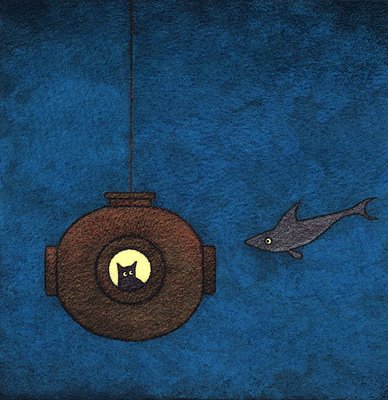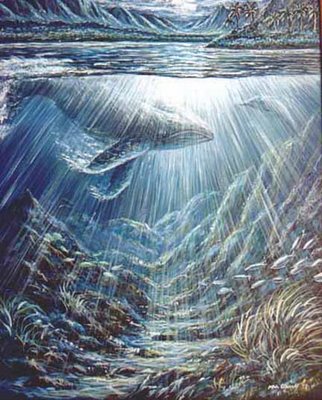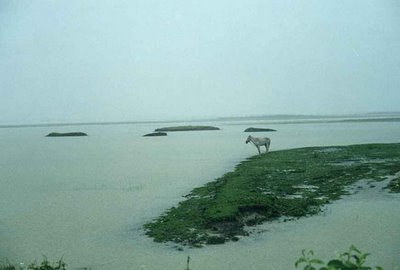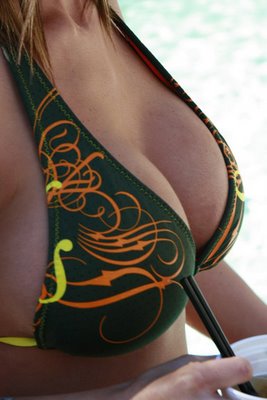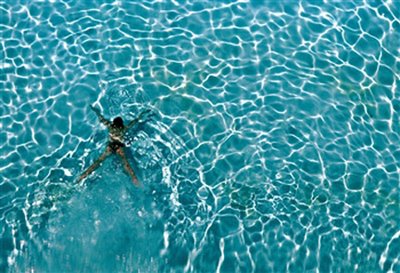Avalon

Do not all charms fly
At the mere touch of cold philosophy?
-- Keats, “Lamia”
The apple was the tree of enchantment in medieval England. It was under a grafted apple tree that Lancelot was asleep when the four fairy queens carried away, and in the “Romance of King Orfeo,” Eurydice was asleep under an apple tree when the Fairy King carried her off. Apples and apple peel are used in several forms of divination, and Avalon, the Isle of the Apples, was the name of the Paradise of Fairyland into which Arthur disappeared. If it was Glastonbury it was none the less Fairyland.
-- Katherine Briggs,
The Fairies in Tradition and Literature (italics mine)
Now ending June and we’re finally
into the rainy season, a wet dream
of seabreezes strolling back and
forth across the peninsula, like
the pendulous breasts in the
shining face of a drunk adoloter
in the Doll House down the Trail.
Lush heat and fusillading streams
of grace while heavens flash and flounder:
That is the year’s moment,
roused from calmer months
and wary of what soon comes
whirling in from the sea to
shores we don’t yet know the name of.
Cat Violet curled on the couch asleep
and Cat Mamacita outside the
opened window to my right,
mewling for love, for food,
for alms of security. I step outside
to pet her some, her black fur
rousing somehow from the dark
garden; she reaches nose to mine
as I look into those frank gold eyes,
whispering softly the richness
of the wild. How long will this miracle
last, how vulnerable it is,
the heart I mean, blown into
durable shapes with the most
fragile of steels -- glass whale,
glass penis, glass cat, glass life --
Upstairs my moody wife
drifts deep in cancer worries,
the simple aspiration of a cyst
in her right breast on Wednesday
pulling out some blood -- a
dangerous sign perhaps though
also usual, said the nurse,
in many procedures on otherwise
benign cysts -- My wife now waits
for the test results to come back,
praying good news will shake
our telephone today, before noon
when the doc’s office closes,
and not have to wait through
the weekend and past Monday
and Tuesday (the office closed
for the long July 4th holiday
weekend). Fear works its
black snake through her
despite three doctors’
assurances - with luck like
hers, she reasons, how could a
simple thing not slide down
screaming to that hell
where all of the other
bad turns in her life have led?
You have to frame her current
fragile state against the ills
of this year -- in her family
alone there’s been a heart attack/stroke,
a death from lung cancer, two
of the family got arrested for
something they didn’t cause,
huge sums were lost in the
court case, her business failed,
our house had to be treated
for the return of drywood
termites. Plus the world has
soured -- good Heavens, spare
us from those Bozos in the
White House! -- and I have
darkened too, my job demanding
ever more, so much work
to be done at home on house
and garden, this morning
work seeming useless,
its poems droning on to
an ever more indifferent
room. Drip drip drip goes
the gall from a teat we don’t
understand; all we can do
is manage as best we can.
So much to love, so much
to lose, this home like an
orange grove hedged in by
all that swings and saws
and plows over just because.
I write these lines down
to bower that fading fragrance
of sweetly knowing thrall,
a liquid pour of breasts and
fur and summer days so
pure they rouse and flash
and expire unravished and
entire, the fruit of a salt
bliss I cannot defend enough
nor lose despite all that goes.
This hour of my singing
is the Avalon not found
on any shore we name,
where an orchard grows
the dreams I pluck and
savor here. Just one taste
of that juice -- incessant,
liquorous, wild -- is enough
to quell the rages and turn
these ink-spilled pages. The
heart at home is a dangerous
affair, an island thick in orchard
bloom with water, black water,
encroaching everywhere. Soon
I must wake and row back
from this dream to enter the
blister bluster of the next day.
Each morning when I drive
off the house at dawn with
its roused blooming garden
in front and a cat in the window
seems to wave farewell to me
from a sacred well deep inside,
a place I’ll lose and never
find again, like Lancelot
back from the apple realm
seamed by four fairy queens,
or Orpheus in the grove at
last light, surrounding by
all of that merry fruit and
none of it responding to
the call of his wife’s name.
I look a last time at our house
having backed out of the
driveway and about to
drive forth -- perhaps my
wife will be in the kitchen,
waving farewell, come back soon --
perhaps not -- And then
steel myself to get into gear,
and to make that orchard real.

JUICE
2002
I turned 13 during my first summer
in Florida, hard-ripped from my
Chicago home when my parents split.
We moved into a new subdivision near
Winter Haven that had been torn from
an orange grove. Just beyond our house
the streets unpaved themselves into thickets
where bulldozers jawed whole trees, eager
to uproot slow makings for a fast buck.
My wounds and the grove’s grafted into
each other through a season of fire,
my parents crossed like swords over
my puberty, old Florida parceled in
fruit bags of Eden. Loss and desire mingled,
sugared, swelled: then burst from every
pore in sweetly mutinous grog.
There were six orange trees in our
yard to plunder; I must have picked
and squeezed two quarts of fresh juice
every day, greedy for its slicksweet pour.
The first gulp always surprised me
with its sharp ardor, thick and loose,
springing a thirst inside mere parch.
That first summer was archangel-
ically hot, a humid blear which called
all earthborn things to high heaven.
I sent my dreams that way as I
hurled baseballs at a pitchback
screen, my wild pitches thonking
like heads on the wood fence.
To dive later into the pool was like
a belt of that juice: delirium plunged in
joy, the pool’s bottom a glade of bright
glitters shushed in blue. I swam lengths
underwater then perched at the edge,
head and shoulders resting on hot concrete
with my legs drifting below. Lulled by
Carole King on the radio and high soaring
crickets, I drowsed in an undulate weave
of ripening girls peeled from their swimsuits,
their nipples pealing a red roar.
Every afternoon it rained hard,
big boomers in from Tampa sweeping
through in great wet sheets which left
me the rest of the day feeling somehow
unslaked. At twilight, the remaining grove
on the other side of the fence grew fierce
with frogs and whatever else pulsed out there,
mounds of a sugar silk-saturate and dark.
On a small radio I listened to hard rock bands
in the black-lit eeriness of my room; eyewhites
and lint burned like hot moons while the
thickening night heaved on my windows in
a rich, purring growl. Oh the sharp tooth I
felt in those songs by Mountain and Cream,
trillingly pure, loud as thirst, raw as plunder.
Thirty years later, that first summer in Florida
chirrs loud in my veins. I sit here in this house
with the windows wide to the humid heat of 5 a.m.
Outside in this small town never far from a fast
Florida buck, sprinkler heads and crickets saw over
that old beast who sleeps only in the linear sense.
Some untamed thirst prowls here as ever, ripened
deep within. My hands ache for the heft of those
oranges warm from ghost orchards; to cleave their
nude fire; to squeeze them down hard on a mount
of ridged whirl, filling this glass past the brim with
remembered gold, spilling juice over all.

SEXUAL WATER
Pablo Neruda
(translated by Robert Bly & James Wright)
Rolling down in big and distinct drops,
in drops like teeth,
in heavy drops like marmalade and blood,
rolling down in big drops, the water
is falling,
like a sword made of drops,
like a river of glass that tears things,
it is falling, biting,
beating on the axle of symmetry, knocking on the seams
of the soul,
breaking abandoned things, soaking the darkness.
It is nothing but a breath, more full of moisture than
crying,
a liquid, a sweat, an oil that has no name,
a sharp motion,
taking shape, making itself thick,
the water is falling
in slow drops
toward the sea, toward its dry ocean,
toward its wave without water.
I look at the , wide summer, and a loud noise coming from
a barn,
wineshops, cicadas,
towns, excitements,
houses, girls
sleeping with hands over their hearts,
dreaming of pirates, of conflagrations,
I look at ships,
I look at trees of bone marrow
bristling like mad cats,
I look at blood, daggers and women’s stockings,
and men’s hair,
I look at beds, I look at corridors where a virgin is
sobbing,
I look at blankets and organs and hotels.
I look at secretive dreams,
I let the straggling days come in,
and the beginnings also, and memories also,
like an eyelid held open hideously
I am watching.
And then this sound comes:
a red noise of bones,
a sticking together of flesh
and legs yellow as wheatheads meeting.
I am listening among the explosion of the kisses,
I am listening, shaken among breathings and sobs.
I am here, watching, listening,
with half of my soul at sea and half of my soul on land,
and with both halves of my soul I watch the world.
And even if I close my eyes and cover my heart over entirely,
I see the monotonous water falling
in big monotonous drops.
It is like a hurricane of gelatin, l
ike a waterfall of sperm and sea anemones.
I see a clouded rainbow hurrying.
I see its water moving over my bones.

THE USES OF ENCHANTMENT
2006
Let’s see, the hour raw and too
early, my facts the usual sortie
of bulldozers crashing into Paradise.
It’s hot and still this morning,
everything shrill beneath a
marauding high pressure front,
the air high with crickets
& faintly acrid with the
smoke of distant brush fires.
I’m writing on like a monkey
in the the wind machine
of an indifferent age, amid
the thickening plethora of
health and money worries
with a faltering and failing world
crowing at the trough
for more toothsome blood.
All of that precisely why
I take such pleasure sitting here
in the brutal nascence of late night,
singing on a strand of
moon and noctal butterflies
and cats sleeping always nearby
and my wife curled in our bed
upstairs in the great feminine
sleep she is the dearest surface of.
Oh and how the garden shifts
from drinking that saturate
to press up close to me,
sighing More even as I would
shut the covers for good on
that wet indifferent wild, declaring
such things well enough spoken of
when I have barely begun to drown
in blue waters just outside
stronger and more strange than any
booze I have known, a chalice
of silver and hard-boned quartz
forever off my lips. There is a tide
which floods my facts with curves
& purrs & the poured nipples of
careens, not despite the difficulty
of long days (for that would ratchet
down the holy calibration), but
because the magic sea’s far
more inland than it seems,
crashing on a shore which
is yet cannot be, right here
between the saying and the said,
insatiably inside the hips of
my beloved’s softly booming No.
Ever between bereaving and bereft,
ever soon to rise and trudge on,
I am yet infused with a sweetness
I can never say or come to know --
a starry lilt of cold sweet jasmine
ferried on tarry boats of smoke,
the bite of exactly what’s dying
and the bit of heaven it releases
to swing voluptuously here, at
least, at last, so naked, soaked, and free.

BODY OF A WOMAN
Pablo Neruda
Trans. Robert Bly
Body of a woman, white hills, white thighs,
when you surrender, you stretch out like the world.
My body, savage and peasant, undermines you
and makes a son leap in the bottom of the earth.
I was lonely as a tunnel. Birds flew from me.
And night invaded me with her powerful army.
To survive I forged you like a weapon,
like an arrow for my bow, or a stone for my sling.
But now the hour of revenge falls, and I love you.
Body of skin, of moss, of firm and thirsty milk!
And the cups of your breasts! And your eyes full of absence!
And the roses of your mound! And your voice slow and sad!
Body of my woman, I will live on through your marvelousness.
My thirst, my desire without end, m wavering road!
Dark river beds down which the eternal thirst is flowing,
and the fatigue is flowing, and the grief without shore.

ICEE
When I was 13 we
lived at the far end
of a new subdivision,
the woods beyond
our fence the worst
wild. Back then I
walked the furthest
for an Icee, yet it
was a routine I loved
that first summer in
Florida. It got me
out of the house,
that sorry ward of
family wounds, my
mother upstairs in bed
and three siblings
warring not so openly
any more, careful not
to rip the sutures
which so rudely
bound us together.
My errand aimed
me away from all
that in a dutiful,
excusable way, what
with that imperial
season dazing us all
in a rising soar of sun
and crickets. It was
both merry and
malevolent, like the
shards of light on
our swimming pool
which seemed to laugh
and burn along the
same lucid skin.
Yes, an Icee was just what
a boy desired in
that pith of suburban
summer, its oblations
as pure as fresh-squeezed
juice. And so I left each
day around 4 p.m. after
the scheduled round of
storms had passed, the
sky by then a stole of
aftermath--steaming
pavement and heat
lightning. I walked
those two dozen blocks
from home with my
t-shirt slung over my
shoulder (necessary
at either end of
the mission). A few
kids rolled by on
Hot Wheels or knocked
clackers on house
porches, but for
the most part I was
always alone. At the
7-11 it was always so
terribly cold, like a
bad brother to the day.
The Icee machine
had two flavors - Coke
and Cherry -- and a
combination of the two.
I poured out the flavored
slush of ice each way,
on different days, believing
each carried a certain joss
to me, that on the right
day, with the right pour
cooling in my hands, those
skies would deliver
love my way. That was all
I cared for then -- not sports,
nor cars nor grades --
just that gift of cool
which would lend my steps
a Bond-like sway and
turn the eyes of pretty
girls my way. — That was
my only thought as I
idled home, Icee in hand,
back to family routines of
chores and dinner which
waited for me unsheathed
and sharp. Just one kiss,
I’d pray up toward summer’s
twilight, seeing no other
way out. And then I’d
sip my Icee, its slush
so sweet and cold that
too-eager draws would
rush a headache my brow.
In a few months I’d learn
to obtain other wares
from that store -- Swisher
Sweet cigars (they wouldn’t
sell me Kools) and
magazines laded with
hussies in red drawers
Soon I would learn darker
reasons to egress from
my home, searching for
cool and cooler comforts
in Florida’s vast suburb,
each house a plot of
paradise, half-acre jots
of personal desire summed
into a bland, common hell
-- But in that raw hot first
season, there was only the
Icee and its way in summer,
deep and sweet and cold
where nothing else held.
My wife and I drove
through that subdivision
a few years back, out on
a long day trip from home.
I hardly recognized
the approach -- so
many miles more
developments and strip
malls: my earlier years
all paved over. My own
old digs seemed cramped,
small and old, the houses
all in that sort of ruin which
Florida ages so fast, once
the first blush has bleached
in the sun. The orange
trees in every yard were
like old olives, bend and
scrabbly, their fruit like a
spent woman’s womb. Our
house was hardly what I
remembered -- new color,
a wing added on, a fence
knocked out to give more
driveway, in which a green
dune buggy sat on blocks.
Whatever we were back
then had fully drained
away, and all that changed
now looked tired. The
store had been boarded up
long ago, it seemed, abandoned
as places go in Florida,
too expensive to raze,
busier corners on which to
build better stores filled
with all the goods. Well,
my thirst grew up too.
In later years I drank iced
vodka, revenantly wired to
its cold blue fang. Doors
opened when I drank it,
rooms revealed, desire’s
zenith spiked by the
lowest means, pitching
the sun into the
Gulf like a speared olive.
Back then each house
I walked past burned with
the purest booze of
possibilities, each
who could very well let me in,
sigh my name, unclasp
the hooks that brassiered
such swollen nipples.
Those twilight walks were
each a voyage down and
out a well of history,
possibility and lust,
burning for a beloved who
hadn’t yet a face.
That was 30 years
ago. Only here do those
summer fades remain,
in some region within,
the storms receding
into that darker interior,
flashing high in their swart
bellies, bathing all in
that last of light, both pink
and sere, the pavement
steaming, a smell of rain
and rotting oranges in the air,
like a funk rising from
mysterious mere, like
the sweat of my own body
in this early, dank day,
where those daily transits
remain in still torrid
corners of this ripening brain.
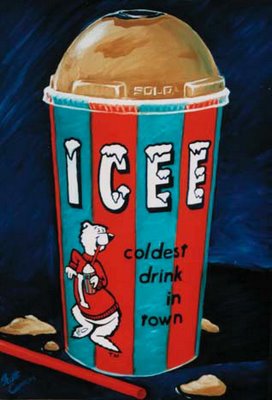
THE ORCHARD
2000
Not much rises
as evaporates.
So many movies
restaraunts
& poems are
threshed empty
in the first
encounter.
In this riven
world where
so much is
about so little,
bad fruit brims
every bushel,
wormed with
self and greed.
We eat the
fruit anyway
because that’s
all there is.
Too much
nakedness
dulls the edge
of sensual dapple,
just as too much
sun withers
the orchard.
Anchorites of
old climbed towers
in the desert
to see God,
searching for
that path to
heaven that was
least obstructed.
May I see her
again on this
dry mount
with only
a glint of
moon on this
chrome pen
to name her.

ORCHARD OCEAN GROOVE
Out of the spirit of the holy temples,
Empty and grandiose, let us make hymns
And sing them in secrecy as lovers do.
— Wallace Stevens
According to P.I. Tretyakov, the Samoyed and
Ostyak of the Turukhansk region go about
initiating the new shaman as follows: The
candidate turns to face the west, and the
master prays the Spirit of Darkness to help
the novice and give him a guide. He then
intones a hymn to the Spirit of Darkness,
and the candidate repeats it. Finally come
the ordeals that the Spirit inflicts on the
novice, demanding his wife, his son, his
goods, etc.
-- Eliade, Shamanism: Archaic Techniques
of Ecstasy, 114
I welcomed my dark master
for all the wrong reasons
though the invocation has
proved a powerfully dark wood.
At 14 I stood next to an orange
grove smoking a cigarette
in the last of late winter light
& breathed deep the pussy
whiskey pale perfume
of sweet orange blossoms
& wanted all of it, scenting
in such endless depth
a way to cast off
the the broken finitudes
of my life til then.
A breeze rippled out
of the motley of that grove,
carrying me into the
years of pure addition,
a thrall amped wild and blue,
stereos roaring and bras upclasping
to a milky flood of
the dark’s familiars,
a tide of booze and
rumped-waved boogaloos.
A dark joy welcomed
me those years to
its noctal Eden
of heavy fruit, made
even more pendulous
by the danger of the reach.
When I had waded hip deep
into that surf & lost all
words for anything else,
I felt the faint
prescience of evil
haul harder from
below, signalling in
the subtractions,
those years of
empty gestures and
savage repetitions
on an endlessly
emptier and harder bed.
Whatever I gained from
the dark I lost far more to it,
far more than any
life can ever presume
to redeem. My failings
ever at that door
she disappeared from
have proved me
worthy and meet
to speak blue addlement
drowned on the lips
of love’s paraclete,
the soror solus which
completes by emptying
the barrel of wild verbs.
I lean these rickety
tall ladders against
a descending wild bliss,
festooning each
step with a bauble
of bright timbrel sound
no one but the
dark can quite hear
much less read, each
a proof of my pickling
in the vats of a black
brine’s brogue. To sing
of the dark these days
is to with great
humility and thrall
resume that sound’s ever
more precarious sums
inside a groove cut
in me long ago
when I turned to
that grove and welcomed
the scent of a sound
of wild waters, letting
my thrill be thus shod
in blueblack master’s
half-hooved,
full-finned throttle
through a sweet wood’s
candescent thick burning
like a black candle deep
in my life where love
is the feral equation
song must sum somehow
with an abacus beaded
orange blossoms and
smiles in the dark
and beds sinking in
a singing blue tide.

THE ART OF POETRY
Pablo Neruda
Transl. Robert Bly
Between shadows and clearing, between defenses and young girls,
having inherited an original heart, and funereal imagination,
suddenly pale, something withered in my face,
in mourning like a desperate widower every day of my life,
for every drop of invisible water I drink
in my sleepy way, and for every sound I take in shivering,
I have the same chilly fever, and the same absent thirst,
an ear coming into the world, an oblique anxiety,
as though robbers were about to arrive, or ghosts,
inside a seashell with great and unchangeable depths,
like a humiliated waiter, or a bell slightly hoarse,
like an aged mirror or the smell of an empty house
where the guests come in hopelessly drunk at night,
having an odor of clothes thrown on the floor, and no flowers,
—in another sense, possibly not as sad—
still, the truth is, the wind suddenly hitting my chest,
the nights with infinite substance fallen into my bedroom,
the crackling of a day hardly able to burn,
ask from me sadly whatever I have that is prophetic,
and there are objects that knock, and are never answered,
and something always moving, and a name that does not come clear.
HARM AND BOON IN THE MEETINGS
Jack Gilbert
We think the fire eats the wood.
We are wrong. The wood reaches out
to the flame. The fire licks at
what the wood harbors, and the wood
gives itself away to that intimacy,
the manner in which we and the world
meet each new day. Harm and boon
in the meetings. As heart meets what
is not heart, the way the spirit
encounters the flesh and the mouth meets
the foreignness in another mouth. We stand
looking at the ruin of our garden
in the early dark of November, hearing crows
go over while the first snow shines coldly
everywhere. Grief makes the heart
apparent as much as sudden happiness can.
-- from The Great Fires (1995)









